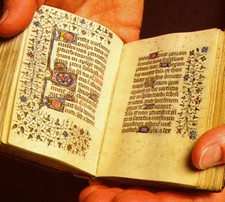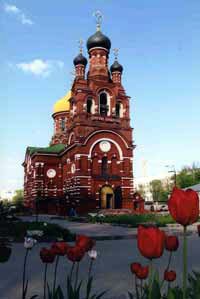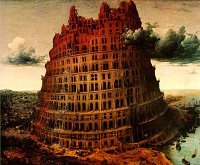In St. Petersburg
I was recently in St Petersburg, the first time since I was there in 1995. It was actually my first business trip ever, one that was paid for completely by the client I am currently working for. I was with a British journalist and another American, a photographer. We didn't stay at a hotel because we were only there for a day and we slept on the express train to and from the northern capital. Our goal was to visit the Russian State Museum of Bread, which we accomplished without any herculean efforts.
The backdrop of this is my new project -writing a little coffee table booklet for an upscale bakery-cafe franchise that is expanding into Russia. I don't know how the British journalist got involved, but I was recommended through my network and basically told the guy that while I didn't feel too enthused about writing ad copy as an art form, I would be amenable for a certain fee. The fee aspect of the creative endeavor was accepted maturely by the franchise holder and I began my journey into the realm of artisan bread in Moscow.
Basically, a budding consumer economy goes through certain changes. The first thing folks do when they throw off the yoke of a badly planned economy is to kick open the doors of opportunity and declare their sovereign dependence on a an unplanned economy, which means a certain percent become professional thieves and the rest get to earn more at jobs which they choose themselves. The bottom line in the consumer aspect of all this is that they ditch their daily bread. Yes, they stop buying bread. The lead on this is that there are other substitute products that are now available and they want to take a spin around the block. Bread sales in Russia are way down because everybody and their brother is buying sushi. The next phase from the bread angle is the introduction of upmarket bread, you know the stuff that comes in individually wrapped bags and costs ten times more.
Russia is well on its way to the fancy loaf, but they're not there yet. So my client, in his altruism, wants to help Russians by recalling their noble bread history in a book that more or less outlines the fact that good bread is back in fashion so eat up. I get to make sure the bread is good with an expense account that includes other stuff like lunch (man cannot live by bread alone) as I ponder artistically on how to ask various proprietors of fancy-pants bakeries if they want free advertising without divulging too much about my employer, who basically wants them to stick their heads up and be counted before he goes and chops them off.
To this end I must get super educated on Russian bread to be a master bread lore kneader. Hence the Bread Museum trip as a form of higher education.
The Bread Museum was much like many other Russian museums and a guide was quickly procured to painstakingly lead us through the horde of stuff behind glass in the several rooms of the museum. My journalist friend spoke better Russian than I, but as he was an anti-foodie and had never sought knowledge of his sustenance beyond the store shelf from whence it came, he had no clue to as to the basic vocabulary of bread or agriculture. We complimented each other fairly well, actually, he was able to stall the lady guide while I wrote stuff down. The photographer went wild, shooting everything in sight and then cooled his heals on a bench as we continued on a grueling 1 hour tour of a place no bigger than a large apartment.
For everyone the highlight was the section on the siege of Leningrad, filled with photos and articles from the nearly one year long battle to survive in an enclosed city. The piece de la resistance was a sampler plate with bread baked with ingredients used during the war when flour was almost unavailable. Notable ingredients included pine tree bast, cellulose originally destined for paper and husks. The hearty loaf that must have satisfied many thousands in strictly appointed rations was so genuine that I felt the siege in my mouth for some time afterwards, blowing out indigestible bits screened by my teeth.
The other highlight was intended to be an interview with a Scottish baker whose brogue was so thick I became had to ask him to repeat himself on the phone to the point of embarrassment. Unfortunately his sense of time was as thick as his accent and after getting trapped in the St.Petersburg metro, we lost our chance to speak with him. He had more important fish to fry and couldn't wait.
We did visit the Aleksandr Nevsky Lavra and the small, almost unknown bakery there. Most of the impressive daily yeild is given away to hospitals and charities, but a good portion is sold Soviet style directly from the post baking room through an awkward hatch in the side of the wall. Though the bread is far from cheap compared to ordinary factory bread prices, there was a substantial crowd of bedraggled pilgrims and humble better bread lovers there for the morning push. The wooden panel over the hatch slides open at 10 am and the bread for sale directly through the hole in the wall is mostly gone before noon. We got inside and met the bakers, two ladies and a skinny hunchback guy, and chatted about bread, which they knew almost nothing about. We got basic details on their operation, but I will have to fill in a lot of gaps.
Here is some errata I have since picked up on the St. Aleksandr Nevsky bakery: the bakery was prodigious immediately after the foundation and construction of the monastery in the early 18th century, setting an example for monastic bread baking across the country. The bread was known for its tasty, thick crust which apparently had something to do with its other venerable quality that made the monastery loaves famous throughout Russia - they stayed fresh for up to a week after they were baked. Peter the First commanded them to increase their production and the Lavra's bakery joined in with a host of other new bakeries in the capital to completely change the face of Russian bread baking, which before this time had been exclusively a domestic effort.
We also ate lunch on the company's tab and this was satisfying. It was so satisfying that we did it more than once.
St. Petersburg is clean, cold and sparsely populated compared to Moscow. The art-deco aspect reminded me of Riga, but it was definitely a friendlier place. It struck me as no irony that we had come all that we to visit a company called 'Baltic Bread' that was the low-light of the trip.
After a days work and hustle, we relaxed with a few of the British guy's Russian friends, which came out of the woodwork to greet him and play host to our company on his behalf. As might be expected, we wound up in a British pub watching football consuming Baltic grains in another form.
All in all, it was a good short trip. I have finished my write up and found supplementary material to make it into a decent historical intro to a book on bread.
Now all I have to do is get the dough for all the kneading. This may indeed be another story.






No comments:
Post a Comment